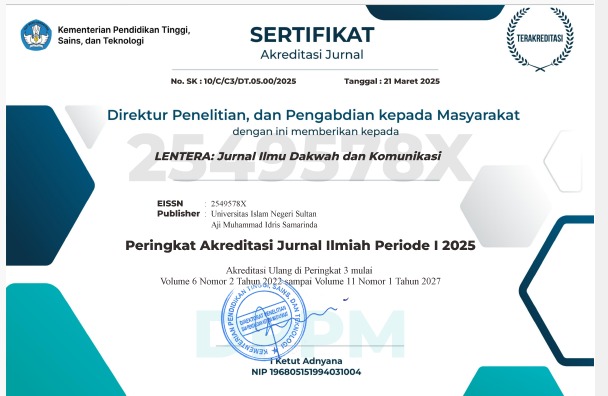From Mimbar to Smartphone: Da'wah's Evolution for Generation Z in the Digital Era
Abstract
This article examines the evolution of Da’wah practices among Generation Z in the digital era, with a focus on how social media platforms shape religious engagement and outreach. Traditional Da’wah, previously conducted in physical spaces like mosques and public gatherings, has increasingly moved to digital spaces such as TikTok and Instagram, making religious teachings more accessible and appealing to younger audiences. Utilizing a qualitative literature review approach, this study synthesizes recent research to analyze the challenges and opportunities presented by digital Da’wah. The findings suggest that digital Da’wah significantly enhances youth engagement, broadens reach, and fosters community building, especially through content that is humanistic, creative, and contextually relevant. However, the study also reveals challenges, such as the potential for misinformation and oversimplification of religious content in these new media. This article contributes to scholarly discourse by offering insights into the strategic use of digital platforms for Da’wah, highlighting how religious leaders can effectively engage Generation Z while promoting a nuanced and comprehensive understanding of Islamic teachings in a digital context. These findings underscore the need for responsible content curation and digital literacy to maintain the integrity of religious messages and address the unique needs of Generation Z.
Copyright (c) 2025 Lentera: Jurnal Ilmu Dakwah dan Komunikasi

This work is licensed under a Creative Commons Attribution-ShareAlike 4.0 International License.
Penulis yang menerbitkan artikel di Lentera: Jurnal Ilmu Dakwah dan Komunikasi setuju dengan ketentuan berikut:
- Penulis memiliki hak cipta artikel dan memberikan hak jurnal untuk publikasi pertama dengan karya yang secara simultan dilisensikan di bawah CC-BY-SA atau The Creative Commons Attribution – ShareAlike Licence.
- Penulis dapat membuat perjanjian kontrak tambahan yang terpisah untuk distribusi non-eksklusif versi jurnal yang diterbitkan dari karya tersebut (misalnya, mempostingnya ke repositori institusional atau menerbitkannya dalam sebuah buku), dengan pengakuan atas publikasi awalnya di jurnal ini.
- Penulis diizinkan dan didorong untuk memposting pekerjaan mereka secara online (misalnya, dalam repositori institusional atau di situs web mereka) sebelum dan selama proses pengajuan, karena dapat menyebabkan pertukaran yang produktif, serta kutipan yang lebih awal dan lebih besar dari karya yang diterbitkan (Lihat The Effect of Open Access)
Authors who publish articles in Lentera: Jurnal Ilmu Dakwah dan Komunikasi agree to the following terms:
- Authors retain copyright of the article and grant the journal right of first publication with the work simultaneously licensed under a CC-BY-SA or The Creative Commons Attribution–ShareAlike License.
- Authors are able to enter into separate, additional contractual arrangements for the non-exclusive distribution of the journal's published version of the work (e.g., post it to an institutional repository or publish it in a book), with an acknowledgment of its initial publication in this journal.
- Authors are permitted and encouraged to post their work online (e.g., in institutional repositories or on their website) prior to and during the submission process, as it can lead to productive exchanges, as well as earlier and greater citation of published work (See The Effect of Open Access).












.png)
